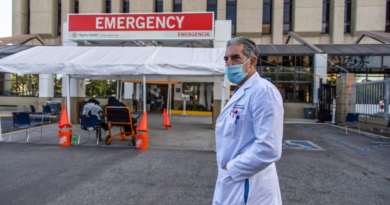Pfizer CEO Albert Bourla wants to tap 'Chinese science' as the drug company looks for a new target after COVID
Addressing COVID-19 helped boost Pfizer’s sales to record levels. Now with the pandemic increasingly in the rear-view mirror, CEO Albert Bourla says cancer is the company’s next big target—and thinks “Chinese science” can be the source of new innovations to “help the world’s patients.”
Pfizer needs new goals as it shifts to a “period of peace,” after a “period of war” during the COVID pandemic, Bourla told Fortune editor-in-chief Alyson Shontell at the Fortune Global 500 Summit in Guangzhou on Thursday.
Bourla, who spoke via video link, referenced a motto he often used to motivate employees during the pandemic in describing the company’s approach to cancer medicine.
“Time is life,” Bourla said. “If we were able to bring a cancer medicine [to market] one year earlier, that means…a very different world for a father or a mother,” he continued.
The Pfizer CEO suggested the company’s success partnering with Germany’s BioNTech on a COVID vaccine, which they brought from formulation to market in just under a year, was a cause for optimism. “The question that we ask ourselves is if we were able to do it with COVID, why not with cancer?” he said. (Before the COVID pandemic, it might have taken up to a decade for a pharmaceutical company to bring a vaccine to market).
The industry might soon be able to match that speed when it comes to cancer treatments, Bourla suggested. “We have a very, very good understanding of why cancer is created, why some medicines work, and then [stop] working,” he said, predicting that both Pfizer and the broader industry will soon be able to introduce new products “every month and every year.”
Time for a pivot
Pfizer’s speed with COVID treatments was good for its business. The company reported a record $100 billion in revenue for 2022. COVID vaccine sales alone came in at almost $38 billion.
But now the boom in COVID treatments is fading.
Pfizer needs another win on the scale of the COVID-19 vaccine or its COVID treatment Paxlovid. In its recent earnings, the company reported a more than 50% decline in sales for its fiscal second quarter when compared to the same period a year ago, and blamed an expected decline in demand for its COVID treatments. Pfizer will release its next quarterly earnings at the end of October.
Earlier this year, Pfizer agreed to acquire the oncology-focused biotech company Seagen for $43 billion, one of the largest acquisitions in 2023 thus far. On Thursday, Bourla suggested the purchase would double Pfizer’s capacity for cancer research.
The deal’s size is attracting regulatory scrutiny: The U.S. Federal Trade Commission has asked for more details, and the EU will decide whether to further probe the deal next week.
Tapping Chinese science
On Thursday, Bourla said he hoped to tap into Chinese expertise in Pfizer’s search for new treatments. There’s been “tremendous progress” in Chinese science, he said, and expressed hopes for “tangible examples of collaboration” in the coming years.
“We can make a difference by enabling [Chinese biotech firms] to do better,” he said.
Chinese biopharmaceutical companies could start to transform the global ecosystem for drug development by 2028, predicts an August report from McKinsey & Company. By early 2022, “China lagged behind only the United States in the market capitalization of biotech companies that had launched since 2015,” and that China has worked to bring its regulatory system to be more in line with global standards.
In March this year, Pfizer signed on to “Healthy China 2030,” an official initiative to expand China’s health coverage and develop its medical industry. At the time, the company said it would focus on improving the health of rural populations.
“The good thing with the Chinese government is that they are very strategic about their priorities,” Bourla said on Thursday. “The best and safest way to be able to have an impact [is] when the efforts of your company and the efforts of the government are all aligned.”
Pfizer is also partnering with local pharmaceutical giants, like Sinopharm and CSPC Pharmaceutical Group, to market and manufacture products like Paxlovid domestically. BioNTech, Pfizer’s partner in creating its COVID vaccine, also won approval from Beijing to provide its mRNA vaccine in China last December—though only to foreigners, and not to locals.
Yet U.S. politicians and officials are increasingly skeptical of business ties between U.S. companies and China.
Chinese biotech was briefly in the crosshairs of the Biden administration last year, with one official saying last October that he’d “put down money” on new U.S. controls on the sector. Ultimately, the White House spared biotech from its recently announced ban on U.S. entities investing in strategic technologies in China.

